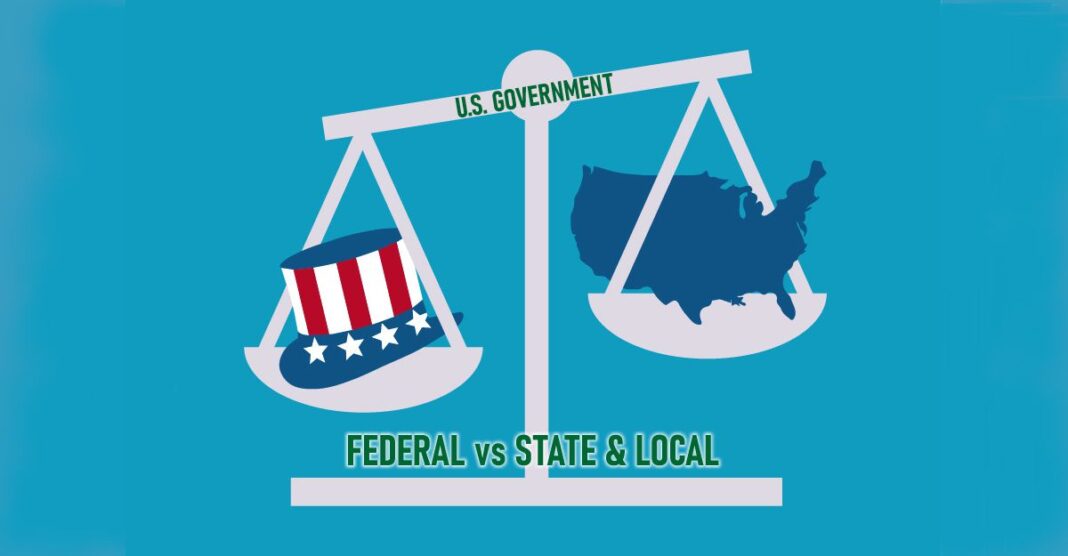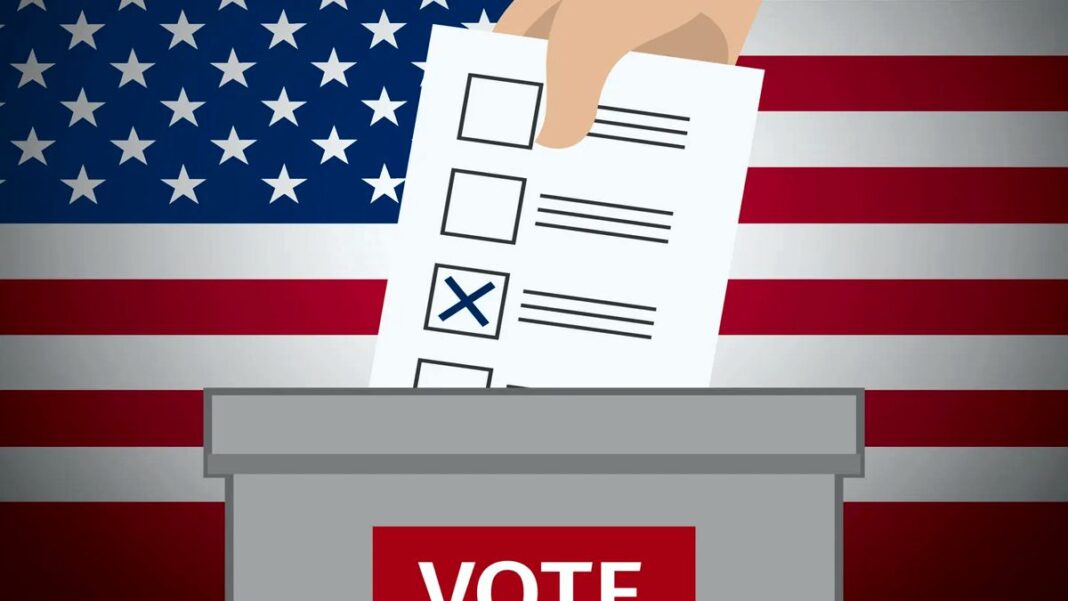Part 3: Series on Devolving Power to the States
Read Part 1: A Federal Gov’t Too Big to Govern: Devolve Power to States
Read Part 2: National Debt Will Force Devolution of Power to the States
The devolution of power from the federal government to the states is highly likely in the next decade. It is not feasible for the U.S. to pay off a $33 plus trillion-dollar national debt that requires annual interest payments of a trillion dollars or more. Debt and deficits will force cuts in federal programs. Many of the cuts will be federal grants to states. When this occurs, devolving national power to the states will be the best option out of a bad situation.
Before a crisis occurs, the feds and the states should negotiate a transition of power to ensure a workable separation of functions and an understanding of the costs involved.
The primary goal of devolving federal power to the states is to alleviate federal fiscal mismanagement as much as possible while enhancing democracy by transferring governmental services to the lowest level of government that can effectively and efficiently manage the programs. It will also require the states to determine which federal programs they want to continue managing and which programs are unneeded within their states. Every program and every level of bureaucracy eliminated saves money for taxpayers.
The federal government has created more government and complexity than it can manage. Devolution of power is essential for the federal government to focus on its most significant responsibilities to protect the nation from threats to national security.
Options for devolving power to the states.
Congress should establish a federal intergovernmental commission to identify the powers to be devolved to the states.
A federal intergovernmental commission composed of members of Congress, governors, and state legislators would be the most straightforward way to approach this process. The Commission’s task would be to identify all federally exercised powers that could be more efficiently and effectively managed by the states. It could start with the thousand-plus grants that entice states to implement federally designed programs. In 2022, the federal government awarded states $1.2 trillion in subsidies. Since the federal government collects the monies given to the respective states from state taxpayers and only returns a portion of what is collected to the states, the states will be in a better financial situation if they tax their citizens for the programs citizens want and drop the unwanted programs.
As leverage against a resistant federal government, States that are reimbursed only a fraction of the program’s cost could refuse to administer federal programs not wanted by their citizens or unaffordable to the state. If the states decline to administer more than a few federal regulatory programs, they would cause chaos as the federal government lacks the personnel to administer the programs without the help of the states.
Such a move by the states would also demonstrate that the federal government, without state cooperation, cannot manage or pay for the government it has created.
When the work of the Commission is complete, its final product would be introduced in Congress and voted upon under rules established by Congress. The federal intergovernmental commission stands the best chance of success since the states would identify the programs they need and are likely to continue. Conversely, Congress would learn from the negotiations about unwanted programs.
Congress could enact a process similar to the Base Realignment and Closure Commission (“BRAC”) that applies to federal domestic programs imposed on states.
If Congress wants to avoid negotiations with the states and their legislatures, it could construct a Devolution of Power Commission comprised of experts to study and report to Congress on the programs most fitting to be transferred to the states. After receiving the BRAC-type report, Congress could do an up or down vote on the entire package as it does under BRAC, or it could allow amendments to ensure more legislative precision.
Re-constitute the Joint Committee on Reduction of Non-Essential Federal Expenditures (“The Joint Committee.”).
The Joint Committee would be similar to the Congressional Committee established by Congress after WWII to get control of the federal deficit. While the Joint Committee was only a study committee, requiring its recommendations to be submitted to authorizing and appropriation committees, it significantly impacted government budgeting by identifying non-essential federal activities.
Such a process keeps all study and decision-making within Congress. Once the recommendations are made, Congress could establish by rule that it must vote on them as a package. Alternatively, Congress could allow the recommendations to go through the regular committee hearings, markup, and floor debate order.
Use of Interstate Compacts to devolve federal powers to the states.
Interstate compacts are cooperative actions between states to advance specific policies and programs. The compacts can be congressionally approved to ensure they have legal recognition, or they could be informal agreements between states to cooperate.
Formal, congressionally approved compacts with other states are established under Article I, sec.10, cl. 3 of the U.S. Constitution. These formal compacts range from boundary disputes to lotteries, river management, drivers’ licenses, to multi-state tax matters. Ballotpedia provides a list of approved compacts from 1785 to 2018. Compacts can be on any subject that concerns several states. Every formal Compact requires congressional approval, which is very time-consuming. Due to approval complexities, States would be unlikely to submit, and Congress would unlikely approve enough formal Compacts to make any difference in the devolution process. While the formal Interstate Compact approach is doubtful for resolving a large number of programs, it is an option that the states and Congress can utilize on the more significant and controversial issues that would grant federal legal status to multi-state cooperative agreements.
The Southern States Energy Compact is a significant success in bringing economic development to the South. It has eighteen members and was created to encourage economic development among its member states by improving energy, environmental, and technology policies.
Under the informal Compact approach, the participating states would cooperate on specific programs without congressional approval. The downside of this approach is that states are free to withdraw at any time without congressional involvement. Moreover, Congress could terminate informal compacts at any time, assuming Congress can secure the votes to repeal an agreement between states or sue to have the compact declared contrary to federal law or unconstitutional. A good example is the climate change compacts. States with similar policy views are organized into regional working units designed to regulate activities of regional concern. For example, nine states in the Northeast and Mid-Atlantic and three west coast states formed regional compacts to address climate concerns in a manner beyond what was allowed under federal law. The states entering these informal compacts initiated a cap-and-trade process that capped CO2 emissions and authorized the trading of emission credits.
While the informal mechanism is an ad hoc approach to devolving power to the states, it could take several of the most controversial domestic issues off the federal plate, such as abortion, welfare, and illegal immigration, other than citizenship. The states in the various Compacts would address these issues uniformly, which will likely be dramatically different from existing federal policy.
Congress could terminate all federal grants and unauthorized programs and immediately save trillions over a few years.
The most drastic approach to devolving federal power is for Congress to terminate its funding for all unauthorized federal programs and all subsidies to the states to manage federal programs. Under congressional rules, Congress cannot fund unauthorized laws without waiving its rules. If Congress does not have the time or interest to reauthorize programs enacted into law, it should not fund them. Moreover, if Congress stops subsidizing states, the states can eliminate the implementation of unneeded federal programs and fund the needed programs at a cost they can afford. Defunding these many programs immediately reduces the federal government’s budget by around $ 1.7 trillion ($432 billion of unauthorized laws and $1.2 trillion in grants to states).
Congress and the president will likely oppose, as infeasible, any devolution of power to the states. Unfortunately, the federal government faces an either/or situation. Either it relinquishes power and cuts its budget to what is manageable by the nation, or it faces a financial crisis that takes the nation to a dark place. Transferring federal programs to the states is a practical alternative to resurrecting a bankrupt nation.
William L. Kovacs has served as senior vice president for the U.S. Chamber of Commerce, chief counsel to a congressional committee, chairman of a state environmental board, and a partner in law D.C. law firms. His book Reform the Kakistocracy is the winner of the 2021 Independent Press Award for Political/Social Change. He can be contacted at wlk@ReformTheKakistocracy.com






